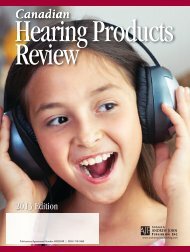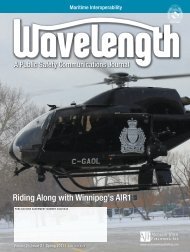Volume 8 Issue 3 (pdf) - Andrew John Publishing Inc
Volume 8 Issue 3 (pdf) - Andrew John Publishing Inc
Volume 8 Issue 3 (pdf) - Andrew John Publishing Inc
You also want an ePaper? Increase the reach of your titles
YUMPU automatically turns print PDFs into web optimized ePapers that Google loves.
|<br />
taBLe 1. Modified assessMents for patients With deMentia<br />
Give short, simple instructions<br />
Practice, to ensure instructions are understood<br />
Provide prompting and encouragement<br />
Accept a variety of responses<br />
Get most valuable information first (i.e. minimize fatigue, agitation)<br />
Speech testing (meaningful stimuli) more successful that PTs; SRTs more reliable<br />
than PTTs<br />
Obtain SATs where SRTs unobtainable<br />
Use any speech material that is effective; meaningful/familiar speech (simple<br />
questions or digits more successful than PBs or spondees)<br />
Test at time of day when most alert (usually morning)<br />
Presence of caregiver/family member may reduce agitation or anxiety<br />
Assess over multiple sessions if needed<br />
<strong>Inc</strong>lude speech in noise and CAP test (s) appropriate to capability, if possible<br />
Objective assessment; acoustic reflexes, ABR (OAEs unlikely)<br />
of 68 years revealed that 16 out of 20<br />
failed the Montreal Cognitive Assessment<br />
test, indicating that they had at least mild<br />
cognitive impairment and suggesting that<br />
cognitive screening is warranted. Many<br />
authors advise us that this is indeed the<br />
case. 6–8 Assessment of cognitive status<br />
through observation of behaviour,<br />
history taking, screening tools, or speech<br />
tests that address working memory and<br />
other aspects of auditory processing and<br />
cognitive function would be a valuable<br />
addition to the audiologic assessment<br />
battery. Similarly, assessment of hearing<br />
should be part of any assessment of<br />
cognitive function, especially since many<br />
cognitive tests are verbal and therefore<br />
impacted by hearing loss. Audiologists<br />
can play an important role in the<br />
education of other health care<br />
professionals in this area, and provide<br />
them with hearing screening tools and<br />
referral criteria.<br />
There are currently no established best<br />
practice protocols for the audiologic<br />
assessment of patients with cognitive<br />
impairment. While those of us working<br />
with elderly clients have developed our<br />
own modifications to test procedures<br />
(see Table 1), it would be helpful to<br />
develop more standardized test protocols<br />
that address the impact of cognitive<br />
decline on patients’ ability to provide<br />
information and the most effective ways<br />
for us to obtain it. We should also<br />
include new tests that provide<br />
information about higher auditory and<br />
cognitive processing; we need to do more<br />
than speech testing in quiet to get<br />
information about the entire auditory<br />
system that will assist with management<br />
decisions. Specialized speech tests can<br />
provide much information about<br />
functional communication ability, CAP<br />
and aspects of cognitive function, and are<br />
available in varying degrees of difficulty<br />
to suit the ability of the patient. Dichotic<br />
tests which target binaural integration<br />
skills, dual tasking and memory target<br />
both auditory and cognitive processing.<br />
The dichotic digit test 9 is recommended<br />
by many in the literature 10 as being the<br />
most appropriate and cost-effective for<br />
use with the elderly, and is currently<br />
under trial in our clinic at Baycrest.<br />
How does knowledge of cognitive status<br />
change what we do Baycrest<br />
audiologists are currently looking at<br />
whether we modify our services based on<br />
awareness of our patients’ cognition, with<br />
a view to developing and integrating best<br />
practice procedures for those with both<br />
hearing loss and cognitive decline. We do<br />
know that there is a great need to<br />
provide and improve services for this<br />
population 11,12 for whom amplification<br />
in the form of hearing aids provides<br />
limited benefit and poses problems for<br />
management. Our current, technology<br />
focused approach is not very successful<br />
for older listeners and needs to be<br />
resituated in a broader context of<br />
audiologic rehabilitation (AR) because of<br />
the important role that training and<br />
therapy play in promoting compensatory<br />
cognitive function. 13<br />
Speech perception difficulties of the<br />
elderly result from a complex interaction<br />
of sensory and cognitive processes, and<br />
arise from peripheral, central and<br />
cognitive changes that occur with age.<br />
Listening, comprehending and<br />
communicating require more general<br />
cognitive operations such as attention,<br />
memory, and language representation. 14<br />
In daily life, listeners constantly take in<br />
bottom-up information using their<br />
hearing, and combine it with “top-down”<br />
knowledge that’s learned and stored in<br />
the brain. The more difficult the listening<br />
conditions, the more effort we have to<br />
make to hear and understand. This<br />
increased listening effort puts more<br />
demands on cognitive resources needed<br />
for other aspects of information<br />
processing such as deriving meaning and<br />
storing in memory. Cognitive decline<br />
makes it harder for older listeners to<br />
ignore, inhibit or suppress irrelevant<br />
acoustic stimuli like music or competing<br />
voices, and attend to the specific voice of<br />
interest. Poorer working memory (WM)<br />
makes it harder to fill in the gaps in<br />
conversation, and the effort of listening<br />
and paying attention means that older<br />
listeners are less likely to understand and<br />
remember what they’re hearing, even if<br />
they hear it. 15 Focusing on the hearing<br />
aid as a “fix” for their communication<br />
problems misleads many clients with<br />
REVUE CANADIENNE D’AUDITION | CANADIAN HEARING REPORT 43






